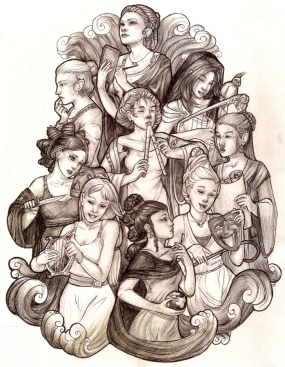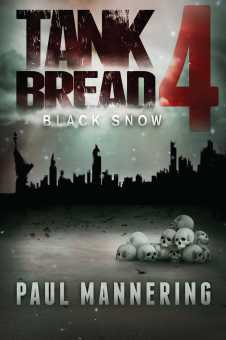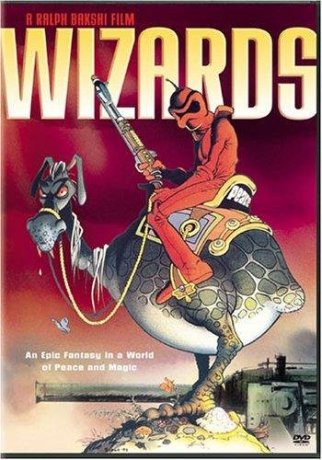The world runs on algorithms. I used to think that these were some dope beats being dropped by Al Gore. It turns out that the truth is far more complex and mystifying (and way less dope*).
At the beginning of the year, I went on a quest. It involved no rings, no hero’s journey, no treasure and a disappointing lack of dragons.
It did however involve asking Googling a really, really stupid question. “How many books have I sold based on my Amazon sales rank?”
This question is ranked #2 of the most commonly asked questions by authors (#1 is of course, “Hey buddy, can you buy me a drink?”)
There are some essential facts that you need to understand about Amazon Sales Ranks.
- They are calculated using a proprietary algorithm that does what all good algorithms do (not make you want to dance) – it calculates a whole shit load of data and produces a result.
- An algorithm is a procedure for solving a mathematical problem (as of finding the greatest common divisor) in a finite number of steps that frequently involves repetition of an operation; broadly : a step-by-step procedure for solving a problem or accomplishing some end especially by a computer a search
- The result will have no relevance or bearing on reality.
- Approximately 100,000 people have worked out how to calculate the relationship to your sales rank on Amazon.com and your actual number of books sold.
- None of these people should be trusted to use a toilet properly without adult supervision.
There was a time, which future historians will call, BKU (Before Kindle Unlimited) aka, The Good Old Days, and it will differ from the current era, FYAB (Fuck You Amazon Bastards) aka, After Kindle Unlimited.
On the surface, Kindle Unlimited is a great idea. Amazon puts millions of dollars in a pot. Everyone who signs up their books to Kindle Unlimited gets a paid a share based on number of pages read. Consumers pay to access the service each month and can then download ebooks to read each month for no further cost.
Of course it took exactly eleven minutes and thirty-eight seconds for some people to work out how to game the system and make a complete farce of the payments authors should receive.
Amazon to date, doesn’t care cares deeply. Jeff Bezos’ minions have acknowledged this issue and say they are working on resolving it… just how – is less clear.
Of course the only way to have any insight on how your Amazon sales rank impacts your writing income, is to record your own data.
My advice in all cases is to not do something optimistic, like take out a loan with your local Russian Mafia boss based on your estimated income from your next quarterly royalty payment. Unless you are indifferent to having kneecaps.
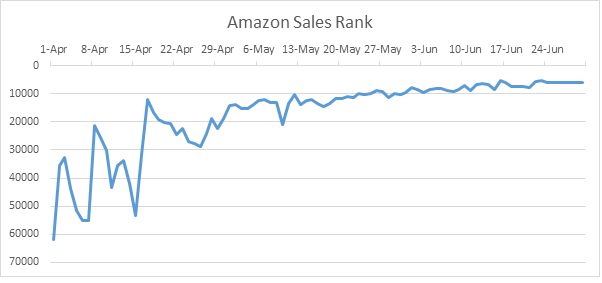
Figure 1. The Amazon Sales Rank for one of my books from 1 April – 30 June 2017.
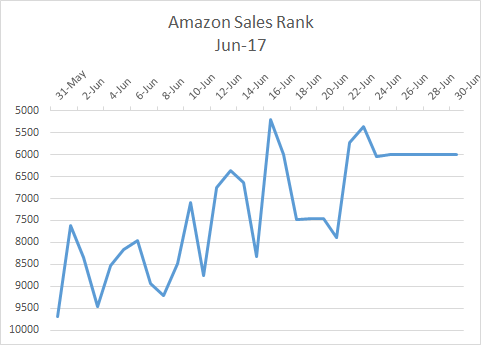
Figure 2. The same book but focused on that higher sales rank period – of June 2017
The number recorded in my spread sheet is the ‘Daily Sales Rank’ figure that Amazon populates its Author Central graph with.
Next important thing to note: The Amazon graph shows your book’s sales rank at a specific point in time in each 24 hour period. That is 12:00 AM PST
It is NOT an average of your sales rank over a 24 hour period. It’s the output of the algorithm applied which includes factors like how many books similar to yours sold in the last hour, and in the last 24 hours and the current moon phase and which dog won the 3rd race of the day at the Wanganui Greyhound Racing Club track on the 3rd Wednesday of the month, except when that day falls on an odd number.
Exactly how many books you sold in the last 24 hours is the kind of data that the algorithm probably sneers at. I mean seriously? What possible relevance would that information have to anything?
I do wonder if Amazon even knows. Or if they just make shit up to keep people confused and the entire thing is a giant Ponzi scheme with the same books being sold to new writer’s friends and family.
The Amazon sales rank data will tell you that ‘Your book is currently ranked X out over 1,000,000 books on Amazon.com.’ That number is out by a factor of at least 10. Again, no one knows exactly how many ebooks are on Amazon’s catalogue – but it’s closer to 13 million than 1 million.
The other thing to remember is that most of the seers who claim that, ‘If your sales rank is X your number of daily books sold is between Y and Z,’ are not taking into account the Kindle Unlimited pages read.
Amazon now includes this statistic in your sales ranking. So if you (like me) see a book ranking consistently in the top 10,000 books out of ALL of Amazon. You sigh. It doesn’t mean you’re selling 100 books a day (which would mean an income of around $100/day). It means that some thousands of pages are being read per day which given the way the Kindle Unlimited prize pool is being looted by bots and scammers, means I’m making more like 10 cents a day.
There are six year olds making sneakers in sweatshops who would refuse to work for that rate.
Amazon provides this happy scenario on their author information page for Kindle Unlimited.
For example, here’s how we’d calculate royalty payout if $10 million in funds were available in a given month with 100 million total pages read (Note: Actual payouts vary and may be less; check your Prior Month’s Royalty Report to see your earnings):
-
Author with a 100 page book that was borrowed and read completely 100 times would earn $1,000 ($10 million multiplied by 10,000 pages for this author divided by 100,000,000 total pages).
-
Author of a 200 page book that was borrowed and read completely 100 times would earn $2,000 ($10 million multiplied by 20,000 pages for this author divided by 100,000,000 total pages).
-
Author of a 200 page book that was borrowed 100 times but only read halfway through on average would earn $1,000 ($10 million multiplied by 10,000 pages for this author divided by 100,000,000 total pages)
So given their fund for the last few months has been $18 Million dollars, this seems like a sweet deal right?
Yeah, nah.
Based on a different book of mine, with Kindle Unlimited pages read from October 2016 – December 2016: total pages read: 48580.
Total royalty payment for this stream: $101.50
Which suggests (based on the shiny example given by Amazon) that there are a shit load more than 100 million total page reads going on (see earlier commentary about bots and scammers). 3 of those titles have been ranked in the top 20,000 in the last six years. Okay, technically it has been the last 8 months and that is entirely due to one publisher who has a marketing plan that works. I just provide the books and they sell them.
What’s the answer?
The answer is the same as it has always been. I have 24 ebook titles on Amazon, including anthologies that I have a story in.
-
- Don’t give up your day job – unless your day job is writing more books. Then really don’t give it up.
- Write more books.
- Write more books
* Feel free to insert an appropriate word instead of ‘dope’ to match the current nomenclature of your youth culture dialogue.
 Last year I posted about not entering the Sunday Star Times Short Story Contest, New Zealand’s “premier” short story contest (free entry, up to $3000 prize, has launched many careers, etc.), because the rules were egregarious. That is, designed to have writers forfeit rights to their stories.
Last year I posted about not entering the Sunday Star Times Short Story Contest, New Zealand’s “premier” short story contest (free entry, up to $3000 prize, has launched many careers, etc.), because the rules were egregarious. That is, designed to have writers forfeit rights to their stories.


